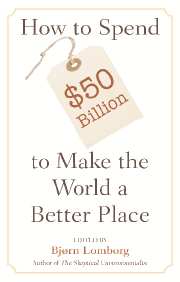Book contents
- Frontmatter
- Contents
- Contributors
- Introduction
- 1 Meeting the Challenge of Global Warming
- CLIMATE CHANGE – OPPONENTS' VIEWS
- 2 Communicable Diseases
- COMMUNICABLE DISEASES – OPPONENTS' VIEWS
- 3 The Challenge of Reducing the Global Incidence of Civil War
- THE CHALLENGE OF CONFLICTS – OPPONENTS' VIEWS
- 4 Toward a New Consensus for Addressing the Global Challenge of the Lack of Education
- THE CHALLENGE OF LACK OF EDUCATION – OPPONENTS' VIEWS
- 5 The Challenge of Poor Governance and Corruption
- THE CHALLENGE OF POOR GOVERNANCE AND CORRUPTION – OPPONENTS' VIEWS
- 6 Hunger and Malnutrition
- HUNGER AND MALNUTRITION – OPPONENTS' VIEWS
- 7 Population and Migration
- POPULATION: MIGRATION – OPPONENTS' VIEWS
- 8 The Water Challenge
- THE WATER CHALLENGE – OPPONENTS' VIEWS
- 9 Subsidies and Trade Barriers
- SUBSIDIES AND TRADE BARRIERS – OPPONENTS' VIEWS
- Expert Panel Ranking
- Index
THE CHALLENGE OF LACK OF EDUCATION – OPPONENTS' VIEWS
Published online by Cambridge University Press: 27 July 2009
- Frontmatter
- Contents
- Contributors
- Introduction
- 1 Meeting the Challenge of Global Warming
- CLIMATE CHANGE – OPPONENTS' VIEWS
- 2 Communicable Diseases
- COMMUNICABLE DISEASES – OPPONENTS' VIEWS
- 3 The Challenge of Reducing the Global Incidence of Civil War
- THE CHALLENGE OF CONFLICTS – OPPONENTS' VIEWS
- 4 Toward a New Consensus for Addressing the Global Challenge of the Lack of Education
- THE CHALLENGE OF LACK OF EDUCATION – OPPONENTS' VIEWS
- 5 The Challenge of Poor Governance and Corruption
- THE CHALLENGE OF POOR GOVERNANCE AND CORRUPTION – OPPONENTS' VIEWS
- 6 Hunger and Malnutrition
- HUNGER AND MALNUTRITION – OPPONENTS' VIEWS
- 7 Population and Migration
- POPULATION: MIGRATION – OPPONENTS' VIEWS
- 8 The Water Challenge
- THE WATER CHALLENGE – OPPONENTS' VIEWS
- 9 Subsidies and Trade Barriers
- SUBSIDIES AND TRADE BARRIERS – OPPONENTS' VIEWS
- Expert Panel Ranking
- Index
Summary
Two quite different views of Lant Pritchett's challenge paper have been put forward. One – by Paul Schultz – is very critical, whereas the other – by Ludger Wößmann – is broadly supportive.
In Schultz's view, Pritchett advances no concrete evidence in support of his view that systemic reform of the education system is the essential way forward. The proposals are entirely hypothetical, and take no account of the powerful entrenched interests that would take considerable political and economic resources to overcome. Without some estimates of these costs and the benefits that would accrue, it is not possible to decide whether this is truly a high worthwhile opportunity.
Schultz also objects to Pritchett giving his main consideration to the most efficient (that is, least costly) delivery of education of a given standard. He believes that the private and social returns on education and the effects of public subsidies are equally important and should have been included in the challenge paper. The prevailing view among international agencies has been that education is a social investment, with returns highest at the primary level. This is the view that Pritchett has also adopted, concentrating on cost-effective provision of primary education to maximize social returns and reduce inequality of earnings within a society.
However, Shultz refers to more recent evidence that the individual benefits of education are often greater at more advanced levels.
- Type
- Chapter
- Information
- Publisher: Cambridge University PressPrint publication year: 2006



